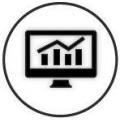This workshop will provide an overview of resources at the D-Lab and elsewhere on campus for getting started with geographic data, spatial analysis and web mapping. Bring your questions and wish list for related workshops you would like to see at the D-Lab.
Sign up for our weekly newsletter!
This is an archive of our past training offerings. We are looking to include workshops on topics not yet covered here. Is there something not currently on the list? Send us a proposal.
Designers and developers! Have you ever made a seemingly-simple change to your site’s CSS, only to discover later that it caused display problems in places you didn’t think to look at? Maybe that change to your mobile menu looks fine at 320px, but unexpectedly breaks at 600.
An intro to the basics that instructors often assume you know, but that you probably never had good instruction on! After this course, you should be able to more easily start learning to program (e.g., in R or python), follow instructions and documentation online (e.g.
This introductory workshop will introduce attendees to the reason for using a qualitative data analysis package for the coding and analysis process. We will begin by discussing the distinction between coding and analysis, the benefits of using a QDA package, and then view a brief demonstration of a specific program.
The R for Data Science workshop series is a four part course, designed to take novices in the R language for statistical computing and produce programmers who are competent in finding, displaying, analyzing, and publishing data in R.
Day 1 (basics of R)
This INTENSIVE offers an introduction to a range of Text Analysis approaches, including dictionary methods, classification and machine learning, TF-IDF, clustering, and topic modeling. Tutorials are performed in R with RStudio.
Day 1: Introduction to text analysis approaches. What is automated text analysis? What questions can we ask and answer using these approaches?
The D-Lab's Qualitative Methods Group (QMG) invites current graduate students who are actively working with qualitative data this semester (collecting, analyzing, or writing about qualitative data) to meet other graduate students interested in forming a support group. These Qualitative Research Support Groups serve as a source of accountability, trouble shooting, and writing groups depending o
Join the Qualitative Methods Group (QMG) for a conversation with Dr. Alice Kelly and Ms. Jenny Palomino about conducting mixed methods research with interview and spatial data. Dr. Kelly and Ms. Palomino will discuss how they ended up merging interview and spatial methods for their project, and the challenges and successes of working with both types of data.
Registration CLOSED: LECTURES ARE FULL
This mini-course introduces machine learning tools to empirically knowledgeable economists and other social scientists. It aims to answer frequent questions we have about this material, such as:
1) What value do these tools have without causal inference?
A long-standing challenge to the broader adoption of R is its command line interface and the steep learning curve of the syntax. This is where Shiny comes in. Shiny is a package that allows you to create HTML based applications that connect to R running in the background. Shiny apps can be run locally or off the internet, making it far simpler for you to share your work with non-R users.
The continuous advancement of web technologies has raised the bar for reporting and visualizing data. Static plots and pdfs are increasingly being supplanted by interactive data graphics. In this workshop, we will learn how to create interactive plots, tables, and maps in R by writing R Markdown documents in RStudio.
The workshop will be an intensive two-day introduction to R using RStudio. Topics will include
The workshop will cover (in a teaching computer lab environment):
Get an orientation to the basics of working with social science data in python. We'll start from the ground up, from the basics of naming variables, making decisions, and repeating operations.
The R Intensive workshop series is designed to take novices in the R language for statistical computing and produce programmers who are competent in finding, displaying, analyzing, and publishing data in R. Details of daily topics are outlined below.
Please note that this workshop series is not a substitute for a course in statistics.
Day 1 (basics of R)
This is exactly the same workshop as the 9am FUNdamentals - there is no need to register for both
This workshop provides an introduction to the basics of programming that instructors, workshops, and documentation typically assume you to be familiar with. You will learn the fundamentals of:
1. Unix
2. Bash
3. Scripting
4. Version control
This workshop provides an introduction to the basics of programming that instructors, workshops, and documentation typically assume you to be familiar with. You will learn the fundamentals of:
1. Unix
2. Bash
3. Scripting
4. Version control
CartoDB.com is a versatile cloud-powered spatial database, mapping, analysis and visualization engine that facilitates the process of building spatial applications for both web and mobile devices. The platform is currently used by major news organizations, research institutions, non-profits and geospatial application developers.
** THIS INTENSIVE HAS BEEN CANCELLED**
We apologize for any inconvenience.
This INTENSIVE offers an introduction to a range of Text Analysis approaches, including dictionary methods, classification and machine learning, TF-IDF, clustering, and topic modeling. Tutorials are performed in R with RStudio.
If you have need to deal with unobserved confounding, selection, or measurement error, this course is for you. This course teaches a rigorous applied survey of modern IV analysis and related techniques, such as regression discontinuity design. We present classical and very recent results from econometrics, statistics, biostatistics, and computer science with a focus on what is useful in practice. The course is aimed at graduate students and researchers in the social sciences, population health sciences, and business.






